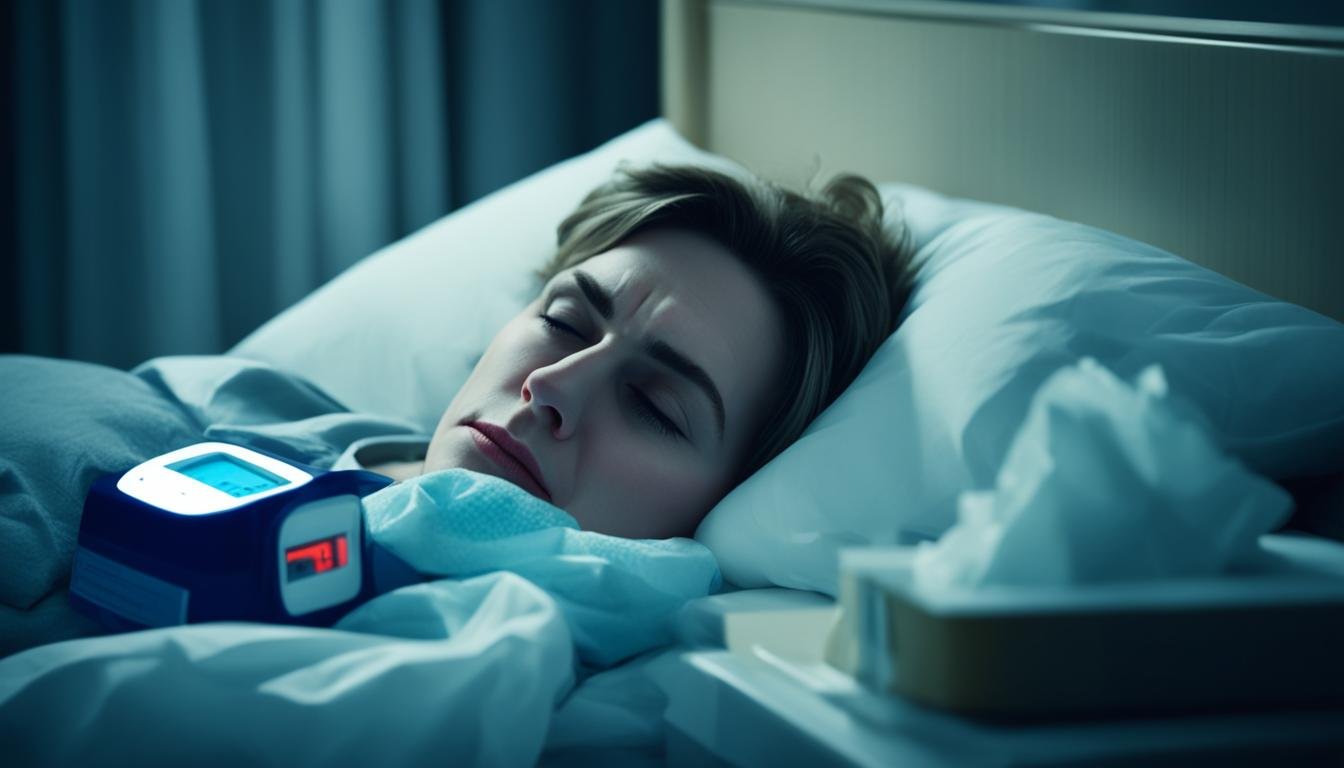The flu is easily spread, and it comes from influenza viruses. It hits you fast with symptoms like fever, chills, and a bad cough.1 There isn’t a direct “cure” for the flu, but you can treat the symptoms.2 It’s essential to catch the flu early, soothe the symptoms, and see a doctor if needed. We’re here to guide you on the best ways to deal with the flu and feel better.
Key Takeaways
- The flu is a highly contagious respiratory illness caused by influenza viruses.
- There is no single “cure” for the flu, but various treatments can help manage symptoms and speed recovery.
- Prompt recognition of flu symptoms and proper management are crucial, especially for high-risk individuals.
- Antiviral medications like Tamiflu and Relenza may help shorten the duration and severity of the flu.
- Practicing good hygiene and getting an annual flu vaccine are effective ways to prevent the spread of the flu.
Understanding the Flu
The flu comes from influenza viruses and spreads easily.3 Symptoms show up fast and often include fever, chills, and aches.3
What Is the Flu?
The flu is a lung infection from flu viruses. It starts suddenly and can be very serious for some people.2
Symptoms of the Flu
Fever, chills, and a bad cough are the main signs. You might also have aches, headaches, and feel very tired. These appear without warning.3
Flu vs. Cold: Differences in Symptoms
Colds come on slowly, maybe with a sore throat first. The flu hits hard and quick, causing serious symptoms like fever and aches.3
Knowing the differences between flu and cold symptoms is key. It can help you know when to see a doctor about the flu.32
Diagnosing the Flu
Healthcare providers diagnose the flu by checking your symptoms. They will look for signs like fever, chills, cough, aches, and tiredness.2 During flu season, they might need just your symptoms to make a diagnosis.
Flu Testing
Providers could also give you a flu test to know for sure. One type is a PCR test.2 These tests are now more common and are very good for finding the flu virus.2
Distinguishing Flu from COVID-19
The flu and COVID-19 have similar symptoms. So, getting the right diagnosis might need extra tests.2 For this, they use tests that check for both flu and the new coronavirus.2
Finding out if you have the flu quickly and accurately is key. Medicines like oseltamivir (Tamiflu) and zanamivir (Relenza) can help. They might make you feel better a day sooner and can prevent serious problems.2 But, remember, these medicines can cause upset stomach. Taking them with food may help lower this side effect.2
Treatment Options for the Flu
The flu can be handled with some key methods. These include getting plenty of rest, drinking lots of fluids, and using over-the-counter drugs. It’s critical to sleep and drink water to help your body battle the virus.2Medicines like acetaminophen and ibuprofen can lower your fever and ease body pains.
Antiviral Medications
In more severe cases, doctors might recommend antiviral meds. Antiviral drugs such as oseltamivir (Tamiflu), baloxavir (Xofluza), and zanamivir (Relenza) are most helpful for very sick patients. They are also great for those at a higher risk of complications.3 These meds work the best if taken in the first 48 hours since you got sick. They can make your illness milder and shorter.23
It’s crucial to remember that antibiotics don’t work against the flu virus. They can’t help manage its symptoms either.3 The CDC advises staying at home until you feel much better. Plus, you should be without a fever for 24 hours without using fever-reducing drugs before going back to your usual activities.
Cure for the Flu
There isn’t a single “cure” for the [cure for the flu]. However, resting, drinking water, and using over-the-counter meds can help.2 It’s crucial to start treatment early, especially for those more at risk. This can stop severe problems from happening.3 Remember, since the flu is a virus, antibiotics won’t work.3 The key is to help your body’s defenses and ease your symptoms.

Home Remedies for Flu Relief
Alongside medical help, there are many home remedies that work for [home remedies for flu], [flu relief], and [flu symptoms relief]. Be sure to drink lots of water, broth, and juices to stay hydrated.4
Staying Hydrated
Drinking 64 ounces of fluids daily can boost your body’s fight against the flu.5 It also helps to thin mucus and avoid dehydration, a flu symptom.
Soothing Throat Remedies
To soothe a sore throat, try lozenges, warm teas, or saltwater gargles. They can remove mucus and relieve ear stuffiness.4 Studies show honey and tea are great for a scratchy throat.5
Clearing Nasal Congestion
A saline spray or humidifier can help with nasal congestion. It lowers stuffiness and stops post-nasal drip to prevent sinus infections.4 Remember, nasal irrigation needs to be safe to avoid any risks.5
These natural steps can go along with medical care to ease the [home remedies for flu], [flu relief], and [flu symptoms relief].
Preventing Flu Spread
To stop the flu from spreading, we need to act first.6 The top way to cut your risk of the flu is by taking a shot every year.7 Everyone over 6 months old should get the flu vaccine to protect themselves and others.7 The flu can jump to people and things near someone sick up to 6 feet away. This happens when the sick person sneezes, coughs, talks, or even laughs.7 They can make others sick about 1 day before feeling bad and up to 5 days afterward.
Staying Home
6 If you’re ill and not feverish for a whole 24 hours, stay home.7 Studies say you can spread the flu to others for at least 5 days after symptoms start. And you should stay away until 48 hours after the last time you’ve had a fever.6 Keeping away from folks who are clearly sick lessens the chance of getting a virus from them.
Hygiene Practices
6 Don’t forget to cover your mouth and nose when you cough or sneeze. It’s one way you can keep others healthy.6 Washing your hands with soap or using a rubbing alcohol is a great defense against catching germs.6 Masks also help stop the flu if worn by someone with it.
Disinfecting Surfaces
6 Cleaning places like counters, railings, and doorknobs often helps stop illnesses from spreading.7 The flu can stay alive on surfaces for up to 48 hours, making cleaning key.6 Making sure there’s plenty of fresh air can also lower virus risks.
6 Employers need to plan ahead for flu season, offer shots at work, and have clean supplies.6 Places like schools should work on keeping the air pure and have rules to keep sick people away from the healthy.
High-Risk Groups and Complications
Older adults and young kids are more likely to face severe flu problems.8 People over 65 often get serious flu complications.8
Infants under 6 months are very vulnerable to the flu, too.8 They face high chances of ending up in the hospital or even dying.8
Chronic Health Conditions
If someone has a long-term health issue, flu risks go up.8 This includes asthma or blood diseases like sickle cell illness.8
Heart conditions, kidney or liver problems also increase the risk. People with diabetes and those who are very obese are in danger as well.8
Even weakened immune systems raise the risk. This can be due to illness or certain medicines.8
When to Seek Emergency Care
Flu signs can worsen quickly in at-risk groups. If someone has trouble breathing, is vomiting a lot, is confused, or has a very high fever they need help fast.8
The flu can kick off dangerous issues like pneumonia. So, quick medical help is very important.8
Flu Vaccination
The best way to prevent the flu is by getting a flu shot every year.9 It’s usually best to get vaccinated by the end of October. This is before the flu season peaks.9 Flu shots lower your chance of catching the flu by as much as 60%. They can also make the illness milder if you do get sick.10
Importance of Annual Flu Shots
Flu shots are key to keep people and communities safe from the flu’s worst effects.10 In the 2019-2020 flu season, they stopped about 7 million cases and 7,000 deaths.10 They also cut the risk of needing intensive care almost in half for adults and children.10 Pregnant women and those with ongoing health issues should definitely get vaccinated, says the CDC.9
Timing for Flu Vaccination
9 The best time for a flu shot is from September to October in the U.S.9 It can still help even if taken as late as February.9 But, you should remember, it’s never too late for a flu shot. The flu season can last until spring.10 It’s surprising, but only about half of Americans get a flu shot each year, even though the flu is very serious. It causes millions of illnesses, hundreds of thousands of hospitalizations, and tens of thousands of deaths.10


Lifestyle and Diet during Flu Recovery
Resting is key for flu recovery, but diet and fluids matter too.11 Eat soups, fruits, veggies, and whole grains. These foods give your body the fuel it needs.11 Drink lots of water, broths, and electrolyte drinks. This keeps mucus thin and prevents dehydration. It also replaces lost fluids from fever.11 Good nutrition and hydration speed up your flu recovery.
Nutritious Foods for Flu Recovery
12 Enjoy foods high in vitamin C to lessen flu symptoms. Oranges, grapefruits, strawberries, and Brussels sprouts are great choices.12 Garlic strengthens your immune system and offers health perks.12 Leafy greens like spinach, kale, and cabbage help with inflammation. They also aid your recovery with their vitamin C and iron.
Staying Hydrated
11 Drink clear liquids to ease upset stomach and diarrhea. This includes clear broth, juice, sports drinks, and ginger ale.11 Warm decaf tea with honey soothes the throat. It’s good for congested airways.11 Orange juice, especially with pulp, boosts your immune system with vitamin C and folic acid.
Precautions and Tips for Managing Flu Symptoms
Rest, drink plenty of water, and take your medicine. Also, avoid things that irritate your lungs. This will make you cough less. If coughing and mucus bother you, use over-the-counter medications to help.
Drinking warm liquids like herbal teas or broth can make your throat feel better. This also helps to get rid of mucus. Adding moisture to the air with a humidifier can make breathing easier.13 Remember, staying home helps prevent spreading the flu. It lets your body focus on getting better.
Take care of yourself by following these tips. They will help you manage flu symptoms.1413 Don’t forget to seek medical help if you need it. This way, you can get better faster and avoid serious complications.


Returning to Normal Activities after Flu Recovery
Once the fever stops for 24 hours without fever-reducing medicine, it’s safe to return to normal activities.15 But, you should be careful not to do too much, too soon.15 It’s wise to ease back into your routine, like work or school, slowly. The flu can make you very tired for a while.15 Make sure to get plenty of rest and drink lots of water to fully recover.
Flu symptoms usually last about a week, with the worst lasting two to three days.16 It’s best to stay home to get better and keep others from getting sick.16 Sleep helps a lot with getting over the flu and lowers the chance of serious problems like pneumonia.16 Eating fresh fruits and veggies is great for your immune system as you recover from the flu.16 By doing these things, you’ll be back to your regular routine smoothly after getting the flu.
Conclusion
There’s no one-stop fix for the flu. But, simple steps like resting, drinking lots, and using over-the-counter medicines help.17 Fast flu symptom management is key, especially for those more at risk. It can prevent serious issues from cropping up.18
Don’t forget – home fixes count too. Things like drinking water, easing a sore throat, and opening up your nose can make you feel better. It’s also very important to be clean and get a flu shot every year. This protects you and those around you from getting sick.
Flu is no joke, yet most people can start feeling better within a week or two.17 Knowing the signs and getting treatment early makes a big difference. It lets you get back to doing what you love sooner. Preventing the flu with a shot and by being clean is really important. It keeps you and others safe.
While the flu doesn’t have one single cure, fighting it from all sides can really help. Medical help, home care, and prevention efforts do a lot.17 Keeping up with flu news and doing your part can make a difference for everyone.18
FAQ
What is the flu and how is it different from a cold?
How is the flu diagnosed?
What are the main treatments for the flu?
Is there a “cure” for the flu?
What home remedies can provide relief for flu symptoms?
How can the spread of the flu be prevented?
Who is at higher risk for severe flu complications?
How effective is the flu vaccine?
When is it safe to return to normal activities after having the flu?
Source Links
- https://www.healthpartners.com/blog/what-to-do-if-you-have-the-flu/
- https://www.mayoclinic.org/diseases-conditions/flu/diagnosis-treatment/drc-20351725
- https://www.cdc.gov/flu/treatment/treatment.htm
- https://www.webmd.com/cold-and-flu/features/treating-flu-at-home
- https://www.piedmont.org/living-real-change/9-natural-cold-and-flu-remedies
- https://www.cdc.gov/flu/prevent/actions-prevent-flu.htm
- https://www.prevention.va.gov/flu/prevention/index.asp
- https://www.marshfieldclinic.org/specialties/primary-care/flu/flu-high-risk
- https://www.mayoclinic.org/diseases-conditions/flu/in-depth/flu-shots/art-20048000
- https://www.cdc.gov/flu/prevent/flushot.htm
- https://www.webmd.com/cold-and-flu/what-to-eat-when-you-have-the-flu
- https://health.clevelandclinic.org/what-to-eat-when-you-have-the-flu
- https://www.mayoclinic.org/diseases-conditions/swine-flu/expert-answers/swine-flu-symptoms/faq-20058379
- https://www.webmd.com/cold-and-flu/coping-with-flu
- https://www.bannerhealth.com/healthcareblog/teach-me/post-flu-recovery-tips-and-questions-answered
- https://www.healthline.com/health/influenza/tips-for-speedy-flu-recovery
- https://www.healthline.com/health/cold-flu/flu
- https://www.cdc.gov/flu/season/faq-flu-season-2021-2022.htm




